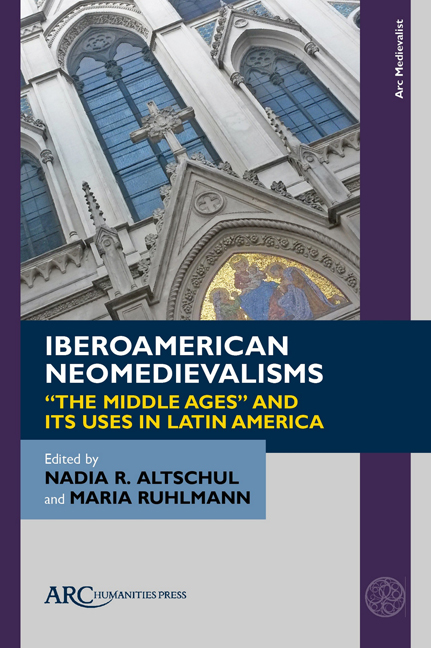Book contents
- Frontmatter
- Contents
- List of Illustrations
- Chapter 1 Postcolonizing Neomedievalism:An Introduction
- Chapter 2 The Criollo Invention of the Middle Ages
- Chapter 3 A Militant and Peasant-Based Medieval History in Brazil: Fanning the Spark of Hope
- Chapter 4 Neomedievalism and the Hagiography of Valdemiro Santiago: Neopentecostal Sanctification
- Chapter 5 The “Middle Ages” in the Brazilian Presidential Elections of 2018: The Left, the Right, and the Centre
- Chapter 6 Averroes in Mid-Colonial and Inter-Imperial Cordoba
- Chapter 7 Hypermedievalizing and De-Medievalizing Dante: Leopoldo Lugones’s and Jorge Luis Borges’s Rewritings of Inferno V
- Chapter 8 Borges and Kennings
- Chapter 9 Memory, Desire, and Sexual Identity in Manuel Mujica Lainez’s El unicornio
- Chapter 10 Rewriting and Visualizing the Cid: The Reconstruction of Medieval Gender and Race in Argentinian Graphic Novels
Chapter 2 - The Criollo Invention of the Middle Ages
Published online by Cambridge University Press: 18 November 2023
- Frontmatter
- Contents
- List of Illustrations
- Chapter 1 Postcolonizing Neomedievalism:An Introduction
- Chapter 2 The Criollo Invention of the Middle Ages
- Chapter 3 A Militant and Peasant-Based Medieval History in Brazil: Fanning the Spark of Hope
- Chapter 4 Neomedievalism and the Hagiography of Valdemiro Santiago: Neopentecostal Sanctification
- Chapter 5 The “Middle Ages” in the Brazilian Presidential Elections of 2018: The Left, the Right, and the Centre
- Chapter 6 Averroes in Mid-Colonial and Inter-Imperial Cordoba
- Chapter 7 Hypermedievalizing and De-Medievalizing Dante: Leopoldo Lugones’s and Jorge Luis Borges’s Rewritings of Inferno V
- Chapter 8 Borges and Kennings
- Chapter 9 Memory, Desire, and Sexual Identity in Manuel Mujica Lainez’s El unicornio
- Chapter 10 Rewriting and Visualizing the Cid: The Reconstruction of Medieval Gender and Race in Argentinian Graphic Novels
Summary
Middle Ages, this period of great vices and heroic virtues, of ignorance, energy, and universal havoc.
It was a late nineteenth-century commonplace to compare the societies, material culture, mentality, and institutions of Spanish and Portuguese America, before and after Independence, with those of the European Middle Ages. While at the beginning of the century foreign visitors made the comparison, soon Latin American intellectuals began drawing parallels between the Crusade and the Conquest, and between European feudalism and the situation created by the existence of extensive land holdings in Latin America. Here, I am not interested in the several implications that the comparison elicits, but in tracing the origins of the Middle Ages as a new category in the Latin American imaginary. Such a category was central for the post-Enlightenment construction of philosophies of history in northern Europe, that is, for the very construction of the idea of Modernity. Proof of this centrality is the special attention that the Middle Ages has received as an historiographical concept.
The incorporation of this new category into the Latin American imaginary during the time of the declarations of independence in the subcontinent is not a minor point. Nevertheless, only the idea of feudalism, which is central in discussions of Marxist and dependentista explanations, has been the object of research. I investigate here other approximations to the Middle Ages found in Criollo thinkers in the first decades of the century, discerning the particular importance of the 1820s–1830s as the fulcrum, however inconsistent, of the incorporation of the idea of the Middle Ages in the Latin American imaginary.
American Enlightenment and the European Middle Ages
In Spain, the rejection of the Middle Ages was not as intense as in other European countries. Spanish Humanists appreciated some aspects of continuity with their medieval past, as can be seen, for example, in the 1545 Historia imperial y cesárea authored by Pedro Mexía. This positive appreciation of the Middle Ages was felt even centuries later. During the eighteenth century, a historicist again extolled medieval constitutions and opposed them to Bourbon absolutism.This tendency extended into the nineteenth century: the French invasion of Spain in 1808 was frequently compared with the Moorish one of 711, and the call to resist it was likened to that of Pelayo resisting the Islamic Conquest in Covadonga.
- Type
- Chapter
- Information
- Iberoamerican NeomedievalismsThe Middle Ages' and Its Uses in Latin America, pp. 19 - 40Publisher: Amsterdam University PressPrint publication year: 2023

